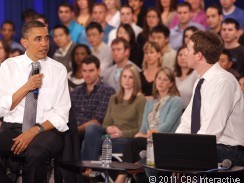Silicon Valley gets political; Support for jobs, taxes from execs

The relationship between Silicon Valley and Washington, which has been evolving over the past few years, may be coming to a turning point - and it looks like Google could be at the center of it.
Google Chairman Eric Schmidt is in Washington today, appearing before a Senate antitrust subcommittee that's trying to determine whether Google uses its search dominance to push competitors out of the results. The questioning doesn't necessarily mean that the government will take any further action. But it could - just as it did more than a decade ago when it filed antitrust charges against Microsoft.
But things aren't the same today as they were back then. The relationship between Silicon Valley and Washington has matured. After years of getting to know each other better, there finally seems to be a mutual respect and understanding between Washington and Silicon Valley about what each brings to the table. But just as Washington has some tough questions lined up for Schmidt, he's delivering his own jabs at lawmakers because of the political bickering over stalled job growth, taxes on the rich and government intervention.
Over the weekend, Google Chairman Eric Schmidt threw in his support for President Obama’s jobs bill during a segment on ABC’s “This Week with Christiane Amanpour,” As one of the so-called “job creators” that gets mentioned in political soundbites, Schmidt isn’t rallying about politicians who are fighting hard to protect his bottom line. Instead, he says the political bickering in Washington has brought job growth to a standstill. He said:
The real problem is not the business community. The real problem is the Democrats and the Republicans fight for one point or another in a political sphere while the rest of us are waiting for the government to do something concrete and predictable. What business needs is predictable, long-term plans. We need to know where is government spending going to be, what are the government programs going to be and off we go. Business can create enormous numbers of new jobs in America. All we need to see is more demand.
Certainly, the tech industry caused some of the job displacement - at the least, by developing technology that automated tasks once conducted by an employee. But Schmidt, an advisor to President Obama, argues that innovation as a driver of growth has long been present. Consider the arrival of machinery that replaced human labor during the Industrial revolution.
The thing to remember, though, is that, while Silicon Valley’s innovation may start in a garage in Palo Alto, tech industries also have a way of spreading their wings and sharing the wealth. Consider the days of PC growth and dot-com frenzy. Silicon Valley may have been the center of it all - but Dell, one of the biggest makers of PCs, is from Texas. And dot-coms brought new energy to other cities, as well, including Austin, Seattle and New York’s Silicon Alley.
Now, there’s a study out of the University of Maryland that says Facebook’s “App Economy” has created nearly 250,000 new jobs and added more than $15 billion to the U.S. economy. And as app economies grow among other companies and sectors (even Google+ is open to the public now and calling on developers to grow the apps), the wealth gets shared among the go-getters who have a skill set and some ambition. And they don’t even need an office with a Palo Alto zip code.
Speaking of Facebook and the Washington connection, let’s not forget the role that tech execs can play in the battles that are casting a dark cloud over Washington. Back in April, President Obama held live Town Hall session on the Interent from Facebook’s headquarters. Next week, Obama will be back in Silicon Valley, hosting another town hall - at LinkedIn this time.
In that April session, the president chummied up with Facebook CEO Mark Zuckerberg by suggesting to Zuck that “people like me and, frankly, you, Mark” need to pony up some more money on Tax Day - and Zuckerberg says “I’m cool with that.”
Zuckerberg may be just one CEO in one industry, but his “cool with that” acceptance of a greater tax burden on the wealthy takes some steam away from the arguments by Obama adversaries who say that higher taxes will hurt the effort to create more jobs. In past years, it might have been easier to dismiss a remark like that from one of those Internet dot-coms out in California.
But it’s much harder to ignore when it comes from a dot-com that’s not only adding jobs, but breathing new life into an economy that desperately needs it.
